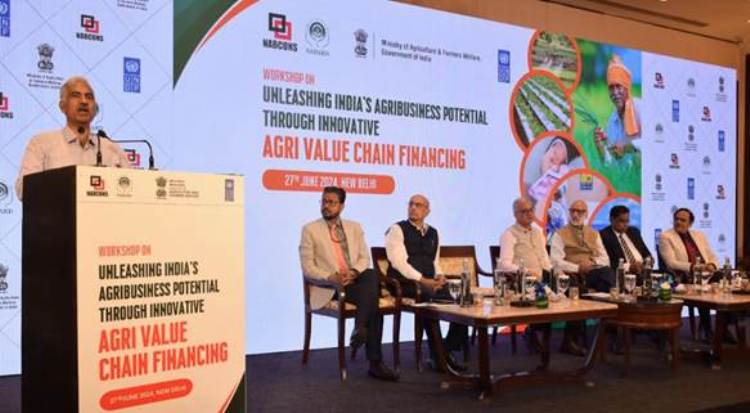The Department of Agriculture and Farmer’s Welfare (DA&FW) organized a workshop titled “Unleashing India’s Agribusiness Potential through Innovative Agri Value Chain Financing” on June 27, 2024, in New Delhi. The event gathered senior officials from the Government of India and State Governments, experts, and stakeholders to discuss the dynamics of agricultural financing.
Manoj Ahuja, Secretary of DA&FW, emphasized the need to shift from a production-centric approach to a demand-driven model in agriculture. He highlighted the importance of developing Agricultural Value Chains (AVCs) holistically and integrating them with global markets. “To meet market demands, we must implement accountable and digital systems for effective AVC development and ensure financial inclusivity for all stakeholders,” he stated.
Ahuja also advocated introducing financial instruments like bill discounting, bridge financing, and risk-hedging to improve liquidity and economic stability. “Creating an enabling environment with simplified application processes and reduced bureaucratic hurdles is crucial for effectively implementing these instruments,” he added.
Dr. Vivek Joshi, Secretary of the Department of Financial Services, stressed the critical role of Digital Financial Services in providing timely credit within the Agricultural Value Chain Financing (AVCF) framework. He noted a significant increase in agricultural credit availability and emphasized the role of NBFCs, fintech, and startups in providing last-mile credit access and specialized financial products, particularly in high-value agricultural markets.
The workshop aimed to create awareness, facilitate collaboration, explore solutions, and empower participants with innovative agricultural finance solutions. Participants from academia, industry, financing agencies, facilitating agencies, and various government departments engaged in high-level strategic discussions. Notable speakers included Prof. Ashok Gulati, a Distinguished Professor at ICRIER, who highlighted the importance of transitioning to a demand-driven approach in agriculture, focusing on nutrition in the food chain, and developing climate resilience.
Shri Ajeet Kumar Sahu, Joint Secretary (Credit) at DA&FW, set the context for the workshop by highlighting the need for a holistic approach to Agricultural Value Chain Financing (AVCF). He noted projections indicating agricultural Gross Value Added (GVA) will reach Rs 105 lakh crore by 2030, making value chain financing increasingly vital.
Chairman of NABARD, Shri K.V. Shaji, emphasized the urgent need to improve farmers' finance access and ensure reliable data availability for SHGs and FPOs, as data is critical for banks to make informed decisions and offer effective value chain financing. He advocated for the development of public infrastructure in rural areas, including facilities for processing, branding, and marketing agricultural products, and strengthening the governance structure of rural cooperatives.
Shri Ritesh Chauhan, CEO of PMFBY, presented on fostering financial resilience in agriculture through the Pradhan Mantri Fasal Bima Yojana (PMFBY) scheme. He emphasized the government's holistic approach to Agri-Value Chain Financing, comprehensive risk protection, and financial support throughout the agricultural value chain. Chauhan highlighted the importance of leveraging technology through platforms like SARTHI, AIDE, Kisan Rin Portal, and AGRISTACK to streamline credit availability and enhance agricultural resilience.
Panel discussions covered various aspects of agri value chain financing, including cluster-based approaches, innovative financing mechanisms, and integrating Farmer Producer Organizations (FPOs) into value chains. Experts from diverse backgrounds shared insights and experiences, enriching the discourse and paving the way for transformative initiatives in India’s agricultural sector.











